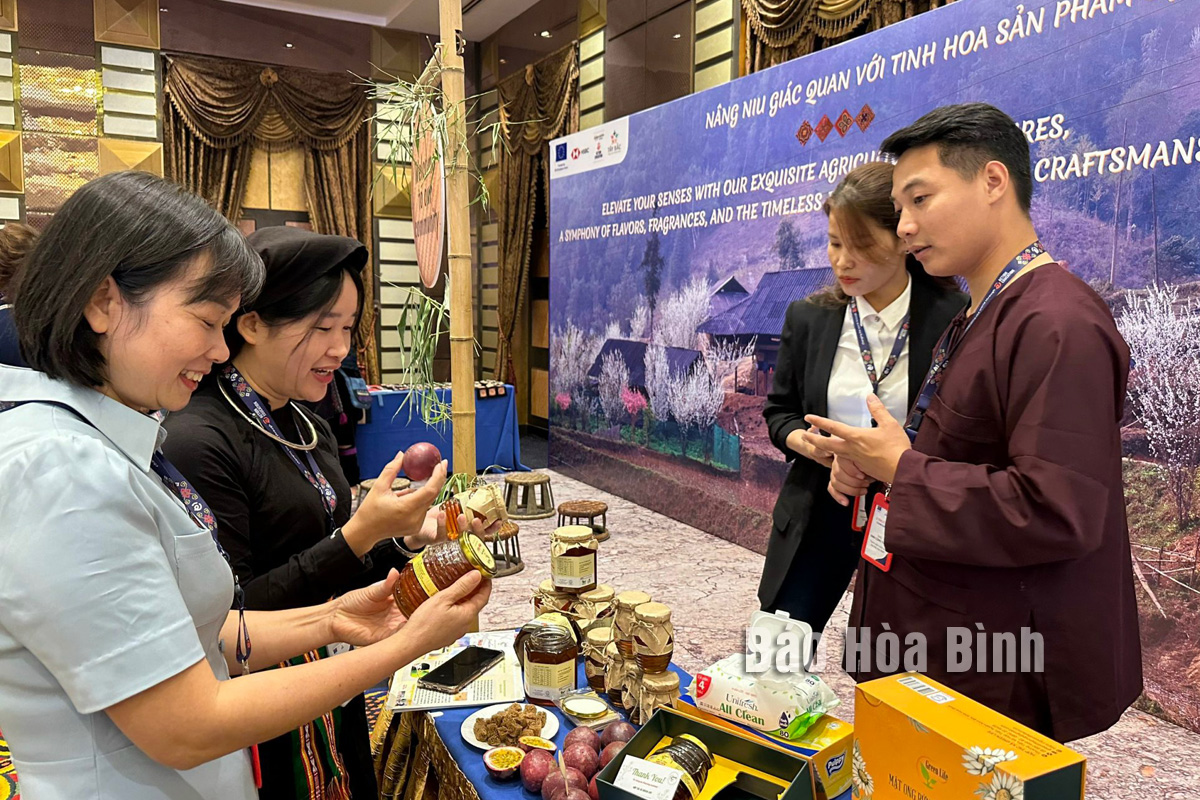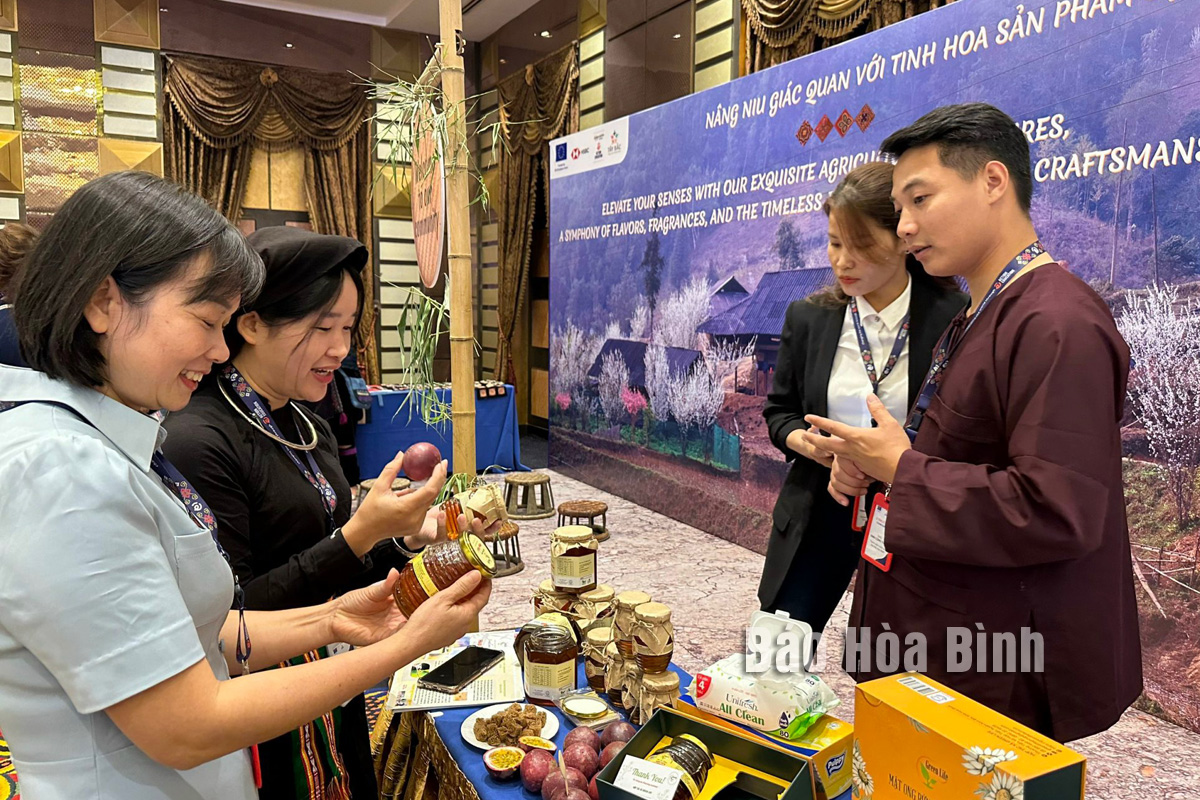
The implementation of the "One Commune, One Product” (OCOP) programme in Hoa Binh province has helped local companies, cooperatives, along with production and business establishments boost the development of their key and typical products, as well as the rural industries and services they are strong at. Science and technology have played an important role in the fast and sustainable development of OCOP products.
The Hop Tien cooperative in Kim Boi district has applied scientific - technological advances to produce forest honey and increase trade promotion, helping the product gain a strong foothold in the market.
Previously, the Yen Tri Agricultural Cooperative in Yen Tri commune of Yen Thuy district manually produced herbal extract products, generating per capita income of only 3 - 3.5 million VND (118 - 137 USD) for its members. Now, by applying high technology such as automatic irrigation systems and modern processing and packaging equipment, productivity and quality have been improved considerably, helping increase product value as well as per capita income by 1.5 - 2 times.
Bui Phi Nam, Director of the Yen Tri Agricultural Cooperative, said the application of high technology has helped to not only raise product value and productivity but also reduce labour costs. For example, the use of automatic and controlled drip irrigation and fertilisation systems has ensured medicinal plants are provided with sufficient water and nutrition to grow even amid unfavourable weather conditions and to have high productivity. As a result, revenue can reach 250 - 300 million VND per ha each year.
There are 158 OCOP products in Hoa Binh province at present, including two with potential five stars, 32 rated four stars, and 124 rated three stars.
Most companies, cooperatives, and production establishments joining in the OCOP programme have actively applied scientific and technological solutions to improve productivity and product quality, according to authorities’ survey.
Besides, the province has also reserved substantial resources with total cost of over 124 billion VND for helping with applying and transferring scientific and technological advances.
Talking about science - technology application and transfer serving the development of key products during 2016 - 2024, Vice Chairman of the provincial People’s Committee Dinh Cong Su said the most observable success of those projects is to have formed connection among scientists, managers, businesses and farmers, apart from building technical infrastructure for agriculture and rural areas. In addition, the projects have also helped train personnel in charge of science and technique for project implementing agencies and units, thus bringing practical socio-economic benefits to local residents and the target localities.
All-level administrations and agencies have also assisted businesses to apply digital technology to boost the sale of OCOP products. In particular, the provincial Department of Agriculture and Rural Development has helped advertise farm produce and OCOP products at conferences and online displays, as well as on some websites and e-marketplaces. Thanks to such efforts, key and typical products of Hoa Binh have become more popular among consumers and gradually gained a foothold in the market.
According to data from the Hoa Binh Provincial Party Committee, the industrial production index for the first six months of 2025 is estimated to have increased by 20% compared to the same period last year. This marks the highest year-on-year growth rate for this period since 2020.
In the first six months of 2025, Hoa Binh province’s export turnover was estimated at 1.145 billion USD, marking an 18.11% increase compared to the same period in 2024. Import turnover was estimated at $ 804 million, a 17.15% increase, which helped the province maintain a positive trade balance.
The lives of the ethnic minority farmers in Tan Lac district have gradually improved thanks to the new directions in agricultural production. This is a testament to the collective strength fostered through the professional associations and groups implemented by various levels of the district’s Farmers’ Union.
With the motto the "product quality comes first,” after nearly one year of establishment and operation, Muong village’s Clean Food Agricultural and Commercial Cooperative, located in Cau Hamlet, Hung Son Commune (Kim Boi district), has launched reputable, high-quality agricultural products to the market that are well-received by consumers. The products such as Muong village’s pork sausage, salt-cured chicken, and salt-cured pork hocks have gradually carved out a place in the market and they are on the path to obtaining the OCOP certification.
In the past, the phrase "bumper harvest, rock-bottom prices" was a familiar refrain for Vietnamese farmers engaged in fragmented, small-scale agriculture. But today, a new spirit is emerging across rural areas of Hoa Binh province - one of collaboration, organisation, and collective economic models that provide a stable foundation for production.
Maintaining growing area codes and packing facility codes in accordance with regulations is a mandatory requirement for agricultural products to be eligible for export. Recently, the Department of Agriculture and Environment of Hoa Binh province has intensified technical supervision of designated farming areas and packing facilities to safeguard the "green passport" that enables its products to access international markets.



